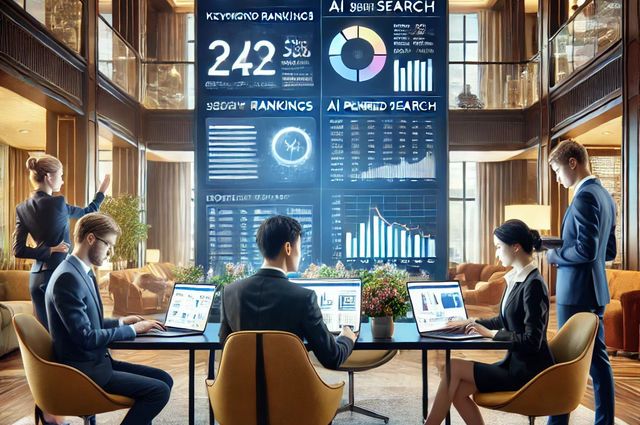Has the much heralded AI Search made traditional SEO obsolete?
10 experts shared their view
Lately, there have been a lot headlines that traditional Search Engine Optimization (SEO) is dead due to the rise of AI Search via the generative AI platforms ChatGPT, Claude, Perplexity, etc.
Some experts herald the end of Google's monopoly on search and claim that traditional SEO practices are obsolete.
Others believe that SEO based on best practices is required not only for increased revenues from the direct online channel, but to ensure good positioning of the hotel website in AI search results as well.
The question is, is traditional SEO dead and what does it take for hotel marketers to win in AI search?
Traditional SEO is not dead, but traditional search is! Consumers simply do not search as they did 10 or 15 years ago.
Social search is now a big component of the customer journey: from TikTok to YouTube to Instagram, the platforms are diverse and usage greatly vary depending on age and traveler habits.
And then generative AI indeed has transformed how we may consider an itinerary to any given destination: ChatGPT Search, Gemini Deep Search, Perplexity... or even tools like Mindtrip, for B2B travel packages. Search with generative AI tools provides only a few brands in the results, rather than thousands of links to click on.
SEO, however, remains important. Or rather, we now need to think in GEO terms - that is, generative engine optimization. It's not just about keywords anymore, but rather context, and content entities. Thus content should be adapted to answer queries in ways that people use LLM tools, which is not exactly the same as when we enter queries in a search engine like Google.
Hotel and travel marketers will need to revisit and enhance content on their websites, blogs and their overall digital footprints, including Google Business Profile, social media outlets and newsletters.
In spite of all the buzz around genAI, the AI Search market share today is estimated around 6% of the total search market, and estimated to go up to 14% by 2028 (Search Engine Land).
Google's own Gemini AI has already been made available to Google's 84 billion monthly users - compare this to ChatGPT's 121 million users! Over 684 times difference! Gemini AI now provides the answers in the search engine results pages (SERPs) on Google.
Because of Gemini AI-provided information, today 58.5% of US Google searches end without any clicks I.e. these are the so called
zero click searches, where the user is satisfied by the AI-provided information in the SERPs.Now, with AI search, what does it take to win? Good old time-tested SEO practices!
- Original, editorial-level content throughout the hotel website
- Website optimized for on-page SEO, inbound/back links and technical SEO: Ex. Less than 2 second page download speed, etc.
- Website has inbound links and citations from highly authoritative websites
- Hotel has solid social media presence with original posts and tons of user-generated content and customer reviews and comments.
In other words: you win AI search by continue implementing solid SEO practices.
I don't believe that SEO is dead. I am of the view that the role of SEO is going to develop in alignment with the evolution of search. After all, it doesn't resemble the way it began with the incumbent approach.
The challenge remains how to be found. Before and as we move forward.
As I have come to understand, content needs to be positioned from the perspective of a Q&A style of approach, which is friendlier to the next generation search. Logical, considering that the essence of the new search tools is conversational. More akin to how we speak to each other.
Structured content needs to be returned in response to a broader inquiry style question or prompt. For me, that suggests that quality of information is important. That is no change from the incumbent approach. I believe we will see in updated SEO tools, a more meaningful application of Keywords (or Keyphrase as it has come to be known), in an even broader way. Keyquestion perhaps?
The parties leading the shift have vested interest in helping the digital public to understand what's required. There's lots of money to be made in the new search paradigm....!
AI might shift SEO practices toward a more user-centric approach, where the emphasis could be on the quality and relevance of content rather than just optimization for search engine algorithms. It could also lead to the rise of semantic SEO, where understanding the meaning behind queries and content becomes more important than just targeting keywords.
AI will certainly influence the future of SEO, but it will likely evolve SEO rather than make it obsolete. Marketers and content creators will need to adapt, using AI as a tool to enhance their strategies rather than replace them entirely.
As AI search impacts traditional search engines, traditional SEO practices will inevitably be affected. Still, it is too early to assert that AI search will demolish Google's dominance for several reasons:
- Google's investment in Gemini AI positions itself to remain competitive in the evolving marketplace.
- Users feeling addicted to Google Search means people are likely to continue using it, even if Gemini AI encounters challenges.
- Core SEO principles, such as creating high-quality and relevant content, remain applicable in AI search environments.
Therefore, hotel marketers should continue producing consistent, authentic, and engaging content while acquiring new skills for AI search optimization. Sometimes, waiting a little bit is not a bad idea.
Organic and paid click-through rates are declining, and AI search is reshaping how some travelers plan trips. But traditional SEO isn't obsolete—it's evolving.
While keyword-driven tactics may lose relevance, strong content, technical SEO, and authoritative backlinks still matter.
For hotels, success in AI search means:
- Ensuring websites are technically sound and mobile-friendly
- Creating high-quality content that directly answers traveler queries
- Using structured data (e.g., schema markup) to enhance visibility
- Maintaining a strong online presence, including reviews and citations
If this sounds familiar, it's because AI optimization (AIO) looks and sounds a lot like SEO. By adapting SEO to align with AI-driven search, hotel marketers can enhance visibility across all platforms.
Currently this question is difficult to answer as no one yet really understands how to optimise for AI. While this optimisation process may be called something other than SEO, it's likely to follow similar principles in terms of creating highly focused, compelling content that addresses the sentiment of consumer queries to feature prominently in AI generated responses. As always, the rules of the advertising, promotion, and distribution games are continuing to evolve, with each step necessitating more, rather than less resources. Leveraging AI Search will follow this natural progressing, compelling companies that want to feature to engage heavily with this SEO-like process to drive direct traffic in the future.
For years, SEO was about playing Google's game—keywords, backlinks, and chasing ever-changing algorithms. But the rise of AI search is rewriting the rules. We're moving from static results to conversational, intent-driven answers generated in real-time.
The numbers don't lie: HubSpot's blog lost 81% of its organic traffic last year. And they're not alone. The old SEO playbook is crumbling under the weight of AI-driven search engines like ChatGPT, Perplexity, and Google's SGE.
So, is SEO dead? No. But it has evolved to Generative Engine Optimization (GEO) or Artificial Intelligence Optimization (AIO) —where structured data, real-time updates, and AI-ready content dictate visibility.
Bottom line? Structure your data, own your reviews, and ensure AI can find (and trust) your content and not much will change for you.
Because, if your hotel wasn't already doing all of these things, we can call it SEO, GEO, or AIO, but you're already invisible...
AI search is changing how travelers find information, but traditional SEO is far from obsolete. At Amadeus, we see SEO evolving alongside AI, not being replaced by it. Our approach combines AI-driven insights with basic SEO practices to keep hotels visible across all search platforms, including AI-powered ones.
By making content more accessible for both AI and traditional search, we help hotels get discovered and boost revenue. Things like structured data, fast-loading pages, and mobile optimization are still very important, while AI helps improve personalization and user experience.
The key is adaptation. AI search may reshape digital marketing, but success comes from blending AI advancements with proven SEO strategies to remain visible, engaging and trustworthy in an ever-evolving search landscape.
I recently co-authored a long and detailed article about this subject, which can be found on HospitalityNet.
In short, traditional SEO tactics like keyword targeting and backlink strategies are no longer sufficient in a landscape soon to be dominated by AI, and the focus is shifting to Generative Engine Optimization (GEO), a strategy centered on creating structured, machine-readable data that aligns with the needs of AI systems and agents.
To adapt to this new environment hotels must up their game, especially towards brand visibility, by making sure their tech stack is ready to provide structured, real-time data to AI search engines (adopting a headless CMS and using technologies such as Anthropic's MCP), create quality, AI-friendly content highlighting the hotel's USP, and leverage guest reviews by encouraging and managing feedback, as user generated content heavily influences AI ranking.
This doesn't mean that traditional SEO is dead just yet: quality content is extremely important for both human and robotic readers, traditional search engines still own most of the marketshare, and building digital authority is just as fundamental, if not even more, for new-gen search engines: well-crafted, relevant and useful content will never go out of fashion, and marketers know it well.










